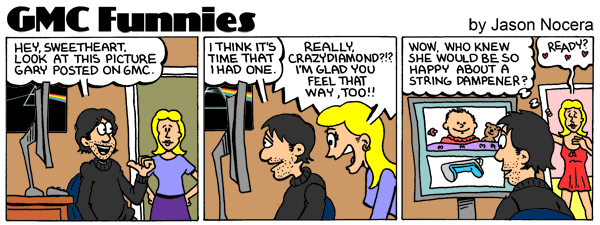What Notes For Improvising? |
|
|
|
|
|
| Mar 5 2010, 03:28 PM |
|
This is a great question.... IMO there is a different ways to look at your fretboard and each perspective allows you to create different melodies....
Ruben_mcn gave you a great suggestions but I can also recommend you to look at the student instructors lesson I have wrote in the past Easy Understandable Fretboard Good Luck with that |
|
|
||
|
|
|
|
| Mar 5 2010, 05:51 PM |
|
You have to learn the chords and arpeggios within a scale to understand what is troubling you. Also you have to know the scale inside out. If you don't know it already, check out my "Mastering Diatonic Scale" lesson. There is CAGED method there. After that you can start learning arpeggios in that pattern, and memorizing them. These arpeggios contain strong notes that appear in chords/harmony, so they are basis for improvising.
-------------------- - Ivan's Video Chat Lesson Notes HERE
- Check out my GMC Profile and Lessons - (Please subscribe to my) YouTube Official Channel - Let's be connected through ! Facebook! :) |
|
|
||
|
|
|
|
| Mar 6 2010, 11:13 PM |
|
You need to learn a way more to be able to improvise better.
Improvisation is actually 95% made of things that we already played/practiced, what we do when we improvise is that we use different segments from different solos/licks and we mix them all together into a new "improvised" part. Learning scale is good for not getting lost on the fretboard but it's not enough, you have to learn more licks, more songs, more solos etc, there is no better way of improving your improvisation ability imo. And as you learn to play new things you'll also learn which strong notes sound "strong" and when. -------------------- Youtube
MySpace Website Album "Let It Out" on iTunes and CD Baby Check out my video lessons and instructor board! The Pianist tune is progress,check it out! "ok.. it is great.. :P have you myspace? Can i to personalize this for you guy?" |
|
|
||
|
|
|
|
| Mar 13 2010, 12:43 AM |
|
One important part that might be overlooked is to be able to sing melodically over the backing track. This can help you tremendously. This way you are not confined to your technical abilities but your over all musical sense.
-------------------- Visit my:
INSTRUCTOR PROFILE "If a composer could say what he had to say in words he would not bother trying to say it in music." Gustav Mahler Subscribe to my Youtube Channel here |
|
|
||
|
|
|
|
| Mar 13 2010, 03:26 PM |
|
One important part that might be overlooked is to be able to sing melodically over the backing track. This can help you tremendously. This way you are not confined to your technical abilities but your over all musical sense. I agree with everyone, and specially with Daniel, when he states that this part is overlooked. Singing a melody is something that sounds natural to humans, and those melodies are usually a lot more natural then playing melodies on a guitar, because, as Muris said, we usually play stuff we practiced/played before, but in a different way. So, forming a natural melody with your voice, and trying to play it on the fretboard will often require new skill of playing, because these melodies can be a lot different from what the beginner guitar players tend to practice. -------------------- - Ivan's Video Chat Lesson Notes HERE
- Check out my GMC Profile and Lessons - (Please subscribe to my) YouTube Official Channel - Let's be connected through ! Facebook! :) |
|
|
||
|
|
|
|
| Mar 24 2010, 08:21 PM |
|
I definitely agree on trying to sing melodies and then finding notes on the fretboard. It may be weird at start but you will get better at it. Resulting melodies/solos will sound much more interesting that way as you will come up with something you wouldn't usually play and don't have it under fingers.
-------------------- For GMC support please email support (at) guitarmasterclass.net
Check out my lessons and my instructor board. Check out my beginner guitar lessons course! ; Take a bass course now! |
|
|
||
1 User(s) are reading this topic (1 Guests and 0 Anonymous Users)
0 Members:































